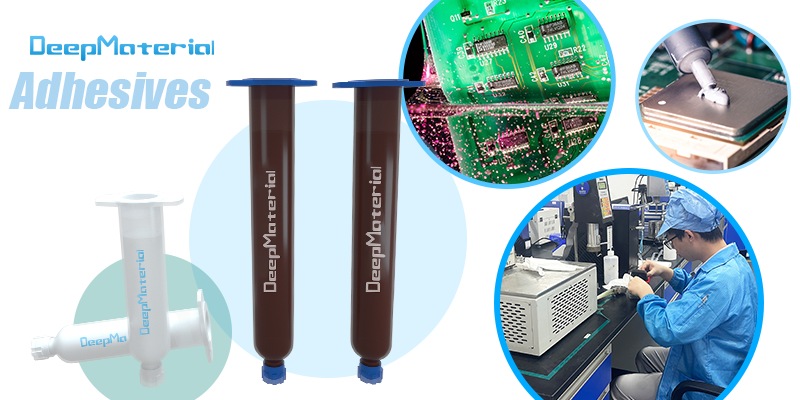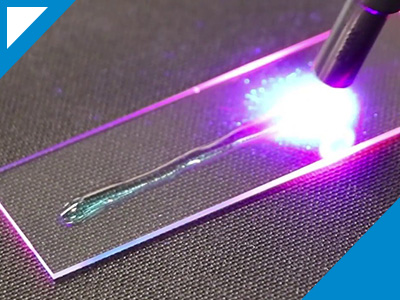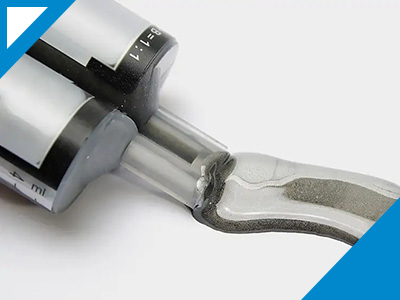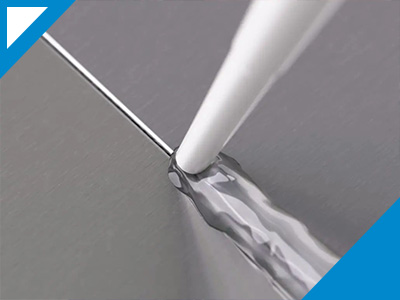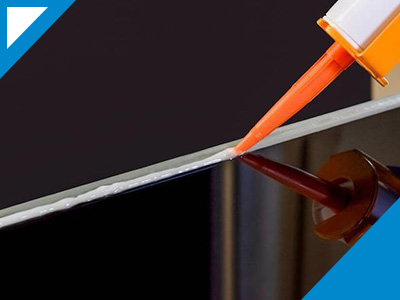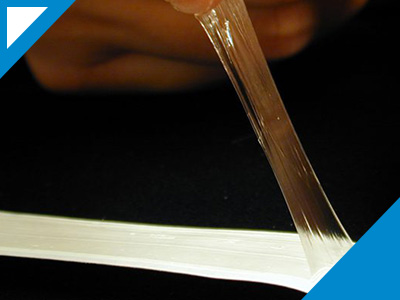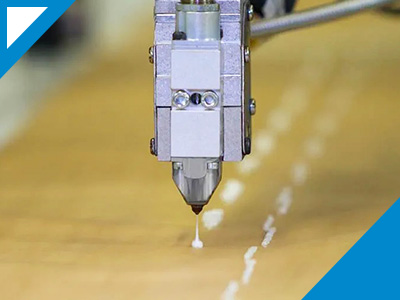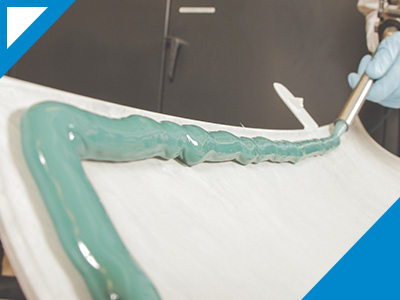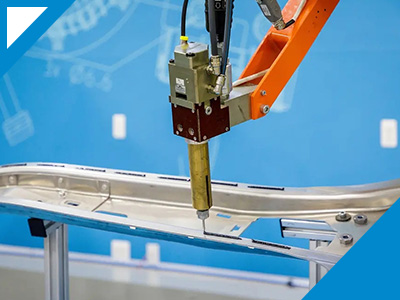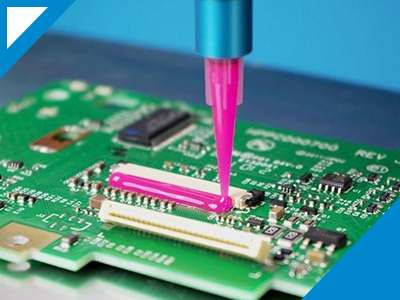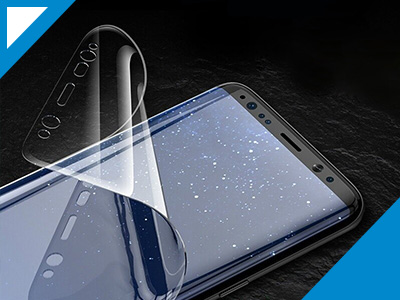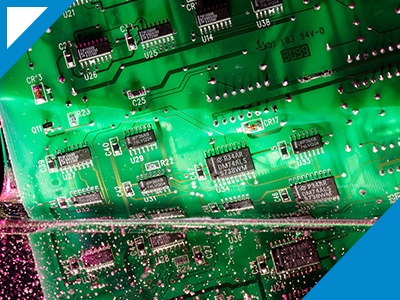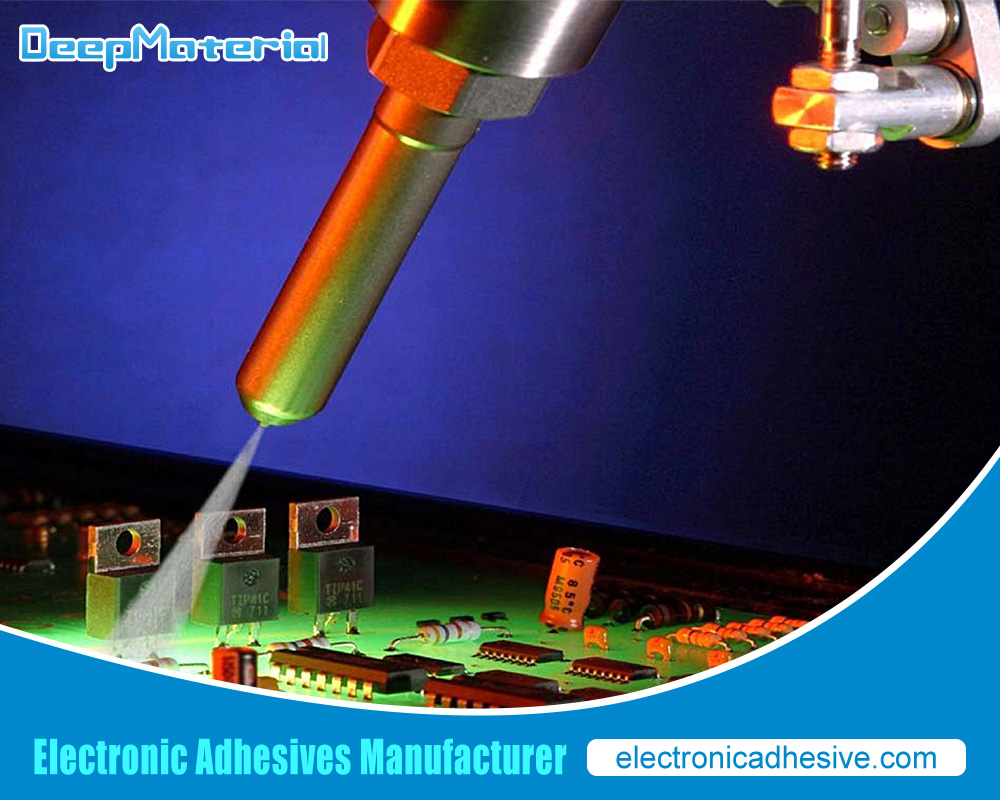Epoxy Adhesive Glue

Epoxy adhesive glue is a two-component adhesive system known for its exceptional strength and durability. Its versatility, ability to bond to a wide range of surfaces, and resistance to chemicals, water, and heat make epoxy adhesive glue widely used in various industrial and commercial applications. In this article, we will explore the properties, applications, and benefits of epoxy adhesive glue.
What is Epoxy Adhesive Glue?
Epoxy adhesive glue is a versatile and robust bonding agent in various applications. It is a type of adhesive that consists of two components: the resin and the hardener. When you mix these two components, they undergo a chemical reaction, which creates a solid and durable adhesive.
One of the key advantages of epoxy adhesive glue is its exceptional bonding strength. It can bond various materials, including metals, plastics, ceramics, wood, and composites. This adhesive forms a rigid and long-lasting bond that can withstand high loads, impacts, and vibrations. It benefits applications that require robust, reliable, and permanent bonding.
Epoxy adhesive glue also offers excellent resistance to chemicals, moisture, and temperature extremes. It is highly resistant to water, oil, solvents, and many other substances, making it suitable for indoor and outdoor applications. Additionally, epoxy adhesive glue can withstand high and low temperatures without losing its adhesive properties, making it ideal for use in harsh environments.
The versatility of epoxy adhesive glue is another notable characteristic. It can be used for bonding, filling gaps, encapsulating electronic components, and even as a coating. Its ability to flow and penetrate small crevices makes repairing cracks and joining irregular surfaces practically. Epoxy adhesive glue can also be modified with fillers to enhance specific properties such as flexibility, conductivity, or flame resistance.
The application of epoxy adhesive glue is relatively straightforward. Mix the resin and hardener in the specified ratio and then apply the mixture to the surfaces you want to bond. The curing time can vary depending on the specific product and environmental conditions. Once cured, the adhesive forms a rigid and durable bond.
However, it is essential to note that epoxy adhesive glue requires proper handling and safety precautions. The components may contain hazardous substances, and following the manufacturer’s instructions for storage, usage, and disposal is essential. Using adequate ventilation and protective equipment minimizes exposure and ensures personal safety.
How does Epoxy Adhesive Glue Work?
Epoxy adhesive glue is a powerful bonding agent that works through a chemical reaction between two components: the resin and the hardener. Here’s a breakdown of how epoxy adhesive glue works:
- Mixing:Epoxy adhesive glue comes in two parts, the resin, and the hardener. These components are typically in liquid form and have different chemical properties, and they need to be mixed in the specified ratio to initiate the bonding process. You can do this task by hand or use equipment specifically designed for dispensing.
- Chemical Reaction:A chemical reaction known as curing begins once you thoroughly mix the resin and hardener. This reaction initiates the transformation of the mixture into a solid adhesive. This reaction is exothermic, meaning it generates heat. The resin and hardener molecules react and form strong covalent bonds, creating a three-dimensional network of cross-linked polymers.
- Bond Formation:As the chemical reaction progresses, the mixture transforms from a liquid state into a solid adhesive. This transformation occurs due to the cross-linking of polymer chains, which gives the epoxy adhesive its rigidity and strength. The adhesive starts to bond with the surfaces it is applied to, creating a durable and permanent connection.
- Curing Time:The curing time for epoxy adhesive glue can vary depending on temperature, humidity, and the specific product used. Following the manufacturer’s instructions regarding the curing time is crucial to ensure optimal bonding strength. During the curing process, the adhesive may go through stages where it becomes tacky, sets partially, and finally reaches full power.
- Adhesive Properties:Epoxy adhesive glue offers several desirable properties that make it widely used in various applications. It has excellent adhesion to different materials, including metals, plastics, ceramics, and composites. The cured epoxy adhesive forms a strong bond that can withstand mechanical stress, impacts, and vibrations. It also resists chemicals, moisture, and temperature extremes, making it suitable for diverse environments.
- Application Considerations:When working with epoxy adhesive glue, it is crucial to consider surface preparation, proper mixing, and adhesive thickness. Surfaces should be clean, dry, and contaminant-free to ensure optimal bonding. Following the recommended mixing ratio and applying the adhesive at the appropriate thickness helps achieve consistent and reliable results.
Types of Epoxy Adhesive Glue
Epoxy adhesive glues come in various types, each with specific properties and applications. Here are some common types of epoxy adhesive glues:
- General-Purpose Epoxy:This type of epoxy adhesive glue is versatile and suitable for various bonding applications. It provides a solid and durable bond on metals, plastics, ceramics, and wood. General-purpose epoxy adhesives resist chemicals, moisture, and temperature fluctuations.
- Structural Epoxy:Due to their specialized design, structural epoxy adhesives provide exceptional strength and bonding performance. They find everyday use in applications that require high load-bearing capabilities, such as bonding metals, composites, and concrete. These adhesives resist impacts, vibrations, and harsh environmental conditions.
- Transparent Epoxy:Transparent epoxy adhesive glues have a specific formulation to provide a clear and colorless bond. They find frequent use in applications where aesthetics are vital, such as glass bonding, jewelry making, and crafts. Transparent epoxy adhesives offer sound clarity, UV resistance, and high bond strength.
- Flexible Epoxy:Manufacturers design flexible epoxy adhesive glues to withstand movement, vibration, and thermal expansion/contraction, enabling them to provide a bond that can adapt to these factors. They find everyday use in applications that require flexibility and durability, such as bonding plastics, rubber, and flexible materials. These adhesives maintain their bond even under challenging conditions.
- Conductive Epoxy:Conductive epoxy adhesive glues contain conductive fillers, making them suitable for electrical conductivity applications. They are a popular choice for electronics, circuit board assembly, and the bonding of electrical components. Conductive epoxy adhesives offer both strong bonding properties and electrical conductivity.
- High-Temperature Epoxy:High-temperature epoxy adhesive glues withstand elevated temperatures without compromising their adhesive properties due to their specific formulation. They find application in industries such as automotive, aerospace, and industrial equipment, where bonding at high temperatures is necessary. These adhesives offer excellent heat resistance and long-term durability.
- Marine Epoxy:Marine epoxy adhesive glues have a unique formulation that resists water, moisture, and saltwater environments. They find everyday use in boat repairs, underwater applications, and marine construction. Marine epoxy adhesives offer superior water resistance, excellent bonding strength, and protection against corrosion.
It is vital to select the appropriate type of epoxy adhesive glue based on the specific requirements of your application to ensure optimal bonding performance and durability. Always follow the manufacturer’s instructions and guidelines for proper usage and safety precautions.
Advantages of Using Epoxy Adhesive Glue
Using epoxy adhesive glue offers several advantages for various applications. Here are some key benefits:
- Strong Bonding:Epoxy adhesive glue provides a strong and durable bond, making it suitable for applications that require reliable and long-lasting adhesion. It creates a rigid connection that withstands high loads, impacts, and vibrations.
- Versatility:Epoxy adhesive glue exhibits excellent bonding capabilities across various materials, including metals, plastics, ceramics, composites, and wood. This versatility makes it a valuable adhesive option for different industries and applications.
- Chemical Resistance:Epoxy adhesive glue offers remarkable resistance to chemicals, including solvents, oils, and acids. It maintains its adhesive properties even in harsh chemical environments, making it suitable for various industrial and commercial settings.
- Water and Moisture Resistance:Many epoxy adhesive glues provide exceptional resistance to water and moisture. These property benefits applications exposed to damp conditions, such as marine environments, plumbing, and outdoor structures.
- Temperature Stability:Epoxy adhesive glue can withstand a wide temperature range without compromising its bonding strength. It remains stable and retains its adhesive properties in high- and low-temperature environments, making it suitable for diverse applications.
- Gap Filling and Gap Bridging:Epoxy adhesive glue can effectively fill gaps and irregular bridge surfaces, allowing for proper bonding even in challenging situations. This ability makes it useful for repairing cracks, sealing joints, and joining dissimilar materials.
- Easy Application:Epoxy adhesive glue is user-friendly and easy to apply. It typically comes in two-part formulations that require mixing before application. Once mixed, it has a suitable viscosity for easy spreading and positioning.
- Customization:Epoxy adhesive glue can be customized by adding fillers or modifiers to enhance specific properties such as flexibility, conductivity, or flame resistance. This versatility allows for tailored adhesive solutions based on particular application requirements.
- Endurance and Durability:Epoxy adhesive glue exhibits excellent resistance to wear, aging, and degradation over time. It provides long-term durability, ensuring the bonded components remain securely attached even under demanding conditions.
- Wide Range of Applications:Epoxy adhesive glue finds application in numerous industries, including construction, automotive, aerospace, electronics, marine, and more. It uses bonding, sealing, coating, encapsulating, and repairing diverse materials and components.
By capitalizing on these advantages, epoxy adhesive glue is a reliable and versatile solution for bonding and joining applications in various sectors.
Disadvantages of Using Epoxy Adhesive Glue
While epoxy adhesive glue offers many advantages, there are also some potential disadvantages. Here are a few drawbacks associated with the use of epoxy adhesive glue:
- Longer Cure Time:Epoxy adhesive glue typically requires a curing process, which can take a relatively long time compared to other types of adhesives. This longer cure time can increase production or assembly time for projects.
- Mixing and Application Complexity:Epoxy adhesive glue is usually a two-component system that requires precise mixing of the resin and hardener in the correct ratio. Improper mixing or inaccurate measurements can affect the adhesive’s performance and bonding strength. Additionally, the need for mixing equipment and careful application can add complexity to the process.
- Limited Flexibility:While epoxy adhesive glue provides excellent strength and rigidity, it may lack flexibility compared to other adhesive options. In applications where materials or components require significant movement or flexibility, there may be better choices than epoxy.
- Sensitivity to Temperature:Epoxy adhesive glue can be sensitive to temperature variations during the curing process and the service life of the bond. Extreme heat or cold can affect its performance and lead to reduced bonding strength or failure.
- Cost:Epoxy adhesive glue is generally more expensive than some other types of adhesives. The specialized formulations and high-performance characteristics contribute to the higher price. Budget constraints should be taken into account when working on this.
- Health and Safety Precautions:Failure to follow proper safety precautions when using certain epoxy adhesive glues can result in exposure to chemicals that pose a health hazard. These chemicals may emit fumes during curing or require protective equipment, such as gloves or masks, to minimize exposure.
- Irreversibility:Once epoxy adhesive glue cures and forms a strong bond, it is challenging to reverse or remove. Disassembly or repairs, such as mechanical methods or specialized solvents, may require additional efforts.
Assessing these disadvantages in the context of your specific application and project requirements is essential. Understanding and considering these factors can help make informed decisions and select the most suitable adhesive for the intended use.
Properties of Epoxy Adhesive Glue
Epoxy adhesive glue possesses several properties that contribute to its effectiveness and wide-ranging applications. Here are some fundamental properties of epoxy adhesive glue:
- High Strength:Epoxy adhesive glue exhibits exceptional bonding strength, providing reliable adhesion between various materials. It forms strong, durable bonds that withstand high loads, impacts, and vibrations.
- Excellent Adhesion:Epoxy adhesive glue demonstrates excellent adhesion to various substrates, including metals, plastics, ceramics, composites, and wood. It creates a robust bond that promotes long-term adhesion performance.
- Chemical Resistance:Many epoxy adhesive glues offer remarkable resistance to chemicals such as solvents, oils, acids, and bases. This property ensures the adhesive remains stable and maintains its integrity even in harsh chemicals.
- Water and Moisture Resistance:Epoxy adhesive glue can exhibit excellent resistance to water and moisture, making it suitable for applications exposed to wet or humid conditions. It helps prevent degradation and loss of bonding strength in such environments.
- Temperature Stability:Epoxy adhesive glue maintains its properties across a wide range. It can withstand high and low temperatures without compromising its bonding strength or integrity.
- Dimensional Stability:Epoxy adhesive glue typically exhibits low shrinkage during curing, resulting in excellent dimensional stability. This property ensures the bond remains secure and minimizes the risk of stress concentrations.
- Gap Filling:Epoxy adhesive glue can effectively fill gaps and irregular bridge surfaces, enabling proper bonding even in imperfect mating surfaces. It provides good gap-filling capabilities, enhancing the strength and integrity of the bond.
- Electrical Insulation:Many epoxy adhesive glues possess good electrical insulation properties, making them suitable for electrical and electronic applications. They help protect against electrical leakage and provide insulation in circuit board assembly and component bonding.
- Cure Time Control:Epoxy adhesive glue allows control over the cure time by adjusting the formulation or using different curing agents. This flexibility enables users to match the curing time with the specific application requirements.
- Durability and Longevity:Epoxy adhesive glue is known for its durability and long-term performance. It resists wear, aging, and degradation, ensuring the bonded components remain securely attached over extended periods.

Curing Time of Epoxy Adhesive Glue
The curing time of epoxy adhesive glue can vary based on several factors. Here are some key points to consider regarding the curing time of epoxy adhesive glue:
- Formulation and Type:Different epoxy adhesive formulations and types can have varying curing times. Manufacturers often provide guidelines or specifications regarding the recommended curing time for their specific product.
- Mixing Ratio:The correct mixing ratio of the epoxy resin and hardener is crucial for proper curing. Deviations from the recommended ratio can affect the adhesive’s curing time and overall performance.
- Temperature:Temperature plays a significant role in epoxy adhesive curing. Generally, higher temperatures accelerate the curing process, while lower temperatures slow it down. Following the manufacturer’s recommendations regarding the optimal temperature range for curing is essential.
- The Bond Line’s thickness: The bond line’s thicknessalso influences the curing time. Thicker layers or larger volumes of epoxy adhesive may take longer to cure than thinner layers. It is essential to consider the desired bond line thickness and adjust the curing time accordingly.
- Environmental Conditions:The surrounding ecological conditions can affect the curing time of the epoxy adhesive. Factors such as humidity, air circulation, and ecological solvents or contaminants can impact curing. Following the manufacturer’s recommendations for optimal environmental conditions is crucial.
- Curing Methods:There are different curing methods available for epoxy adhesive glue, including room temperature curing, heat curing, and UV curing. Each method has its specific curing time requirements, and it is crucial to select the appropriate form based on the application and desired curing time.
- Post-Cure Time:While epoxy adhesive may achieve initial curing within a specified time, it is essential to note that achieving full strength and maximum properties can take longer. Some epoxy adhesives require a post-cure period to reach their optimum performance.
- Testing and Verification:Testing and verifying the cured epoxy adhesive before subjecting it to load or stress is advisable. Ensuring the adhesive has completely cured and achieved the desired strength and performance features is vital.
Understanding the factors that influence the curing time of epoxy adhesive glue allows for proper planning, application, and obtaining desired bonding results. Following the manufacturer’s instructions and recommendations for optimal curing conditions is essential to achieve reliable and long-lasting bonds.
How to Apply Epoxy Adhesive Glue
Effectively applying epoxy adhesive glue requires attention to detail and following proper procedures. Here are some key points to consider when using epoxy adhesive glue:
- Surface Preparation:Clean, dry, and free the covers intended for bonding from contaminants such as dust, grease, or oil. Proper surface preparation is crucial to achieve a solid and durable bond.
- Mixing: Epoxy adhesive glue typically consists of two components – resin and hardener. Follow the manufacturer’s instructions to measure and mix the components in the recommended ratio accurately. Thoroughly mix the resin and hardener until they are uniformly blended.
- Timing:Once you mix the epoxy adhesive components, work efficiently as the curing process begins. Consider the pot life and the time window for applying the adhesive before it hardens. Avoid mixing more adhesive than can be used within the pot life.
- Application Technique:Use a suitable method such as a brush, spatula, or syringe to apply the epoxy adhesive to one of the surfaces intended for bonding. Ensure even and adequate coverage on the surface, avoiding excessive application that could lead to excess squeeze-out or weak bonds.
- Assembly:
- Align the bonded surfaces carefully and firmly press them together.
- Apply sufficient pressure to ensure intimate contact and remove any air bubbles.
- Consider using clamps, tape, or other appropriate tools to hold the components in place during curing.
- Curing:Allow the epoxy adhesive to cure per the manufacturer’s instructions. You may need to maintain specific conditions such as temperature range, ambient conditions, or a set curing time to ensure proper curing. It is essential to adhere to the recommended curing conditions throughout the entire process.
- Post-Cure: Some epoxy adhesives may require a post-cure process to attain maximum strength and properties. Follow any post-cure recommendations provided by the manufacturer to ensure optimal performance.
- Clean-Up:Clean any excess adhesive or spills promptly using the recommended solvents or cleaning agents before the adhesive fully cures. Once the adhesive cures, removal may become more complex.
- Safety Precautions:Use proper precautions when handling and applying epoxy adhesive glue. Wear appropriate protective equipment, such as gloves and eye protection, and work in a well-ventilated area to minimize fume exposure.
Following these guidelines and the manufacturer’s instructions will help ensure proper application and optimal bonding performance when using epoxy adhesive glue.
Precautions to Take While Using Epoxy Adhesive Glue
Precautions to Take While Using Epoxy Adhesive Glue:
- Wear protective gear:Always wear gloves, safety glasses, and a mask to protect your skin, eyes, and respiratory system from potential irritants and fumes emitted by epoxy adhesive glue.
- Work in a well-ventilated area:Ensure proper airflow by working in a well-ventilated space or using a fan or open windows. Using this method, you can minimize the inhalation of fumes and eliminate any unpleasant odors that may arise during the curing process.
- Follow instructions carefully:Read and understand the instructions provided by the manufacturer before using the epoxy adhesive glue. Adhere to the recommended mixing ratios and application techniques to achieve optimal results.
- Conduct a patch test:Before applying the adhesive to a large area, perform a patch test on a small, inconspicuous area to ensure material compatibility and assess the bond strength.
- Avoid direct skin contact:Epoxy adhesive glue can cause skin irritation and allergic reactions. Prevent direct contact by wearing gloves and promptly washing any exposed skin with soap and water.
- Prevent eye contact:If the glue comes into contact with your eyes, immediately flush them with water for at least 15 minutes and seek medical attention promptly.
- Store epoxy adhesive glue properly in a cool, dry place, away from direct sunlight and heat sources. Ensure that you tightly seal the containers to prevent premature hardening or degradation of the adhesive.
- Keep away from children and pets:Store epoxy adhesive glue out of reach of children and pets, as ingestion or accidental exposure can be harmful.
- Dispose of waste responsibly:Dispose of unused or expired epoxy adhesive glue and its containers according to local regulations. Avoid pouring it down the drain or disposing it in the regular trash.
- Seek medical attention if needed:If you experience any adverse reactions or have concerns about your health after using epoxy adhesive glue, seek medical advice promptly.
Remember to exercise caution and prioritize safety when working with epoxy adhesive glue to ensure a successful and safe application process.
Surface Preparation for Epoxy Adhesive Glue
Proper surface preparation ensures a strong and durable bond using epoxy adhesive glue. Following these steps will help maximize the adhesive’s effectiveness and enhance the overall success of your project.
- Clean the surface:Start by thoroughly cleaning the surfaces to be bonded with the epoxy adhesive glue. Remove any dirt, dust, grease, or other contaminants hindering adhesion. Use a mild detergent or appropriate cleaning solution, rinse, and completely dry the surface.
- Remove old adhesives or coatings:If there are existing adhesives, coatings, or sealants on the surface, remove them using suitable methods such as sanding, scraping, or chemical solvents. Ensure that the surface is smooth and free from any residue.
- Roughen the surface:For better adhesion, roughen smooth surfaces such as metal, glass, or plastic using sandpaper or an abrasive pad. This process, known as “abrading,” creates a rough texture that improves the bonding strength.
- Etch or degrease the surface (if necessary):Sometimes, when the surface is exceptionally smooth or resistant to adhesion, you may need to etch or degrease it. You can use acid etching or solvent-based degreasers following the manufacturer’s instructions.
- Dry the surface:After cleaning, removing old adhesives, and roughening or etching (if required), ensure the surface is dehydrated before applying the epoxy adhesive glue. Moisture can negatively affect the bond, so allow sufficient time for drying or use a heat gun to speed up the process.
- Protect adjacent areas:If adjacent areas or parts should not come into contact with the epoxy adhesive glue, protect them using masking tape or a suitable barrier. By doing this, you can avoid unintentional spreading or undesired bonding.
- Follow the manufacturer’s recommendations:Different epoxy adhesives may require specific surface preparation. Follow the manufacturer’s instructions and guidelines for the particular product you are using to achieve the best results.
- Consider temperature and humidity:Consider the recommended temperature and humidity range for applying the epoxy adhesive glue. Extreme temperatures or high humidity levels can impact the curing process and bond strength, so ensure suitable conditions for optimal performance.
- Conduct a trial application (optional):If you are still determining the adhesion of the epoxy adhesive glue to a particular surface, consider performing a trial application on a small area to assess its effectiveness before applying it to the entire surface.
Applications of Epoxy Adhesive Glue in Different Industries
Applications of Epoxy Adhesive Glue in Different Industries:
- Construction industry:Construction professionals use epoxy adhesive glue to bond concrete, metal, wood, and ceramics. It finds utilization in joining structural elements, fixing cracks, anchoring bolts, and bonding decorative elements.
- Automotive industry:Epoxy adhesive glue finds numerous applications in the automotive sector. Many commonly use it to bond metal components, seal joints, and repair body panels. Epoxy adhesive’s high strength and resistance to temperature, chemicals, and vibrations make it suitable for automotive assembly and repairs.
- Electronics industry:Electronics manufacturing and assembly processes extensively rely on epoxy adhesive glue. Many commonly use it to bond components, encapsulate circuitry, pot electronic devices, and seal connections. Its electrical insulation properties and ability to protect against moisture and environmental factors make it ideal for electronic applications.
- Aerospace industry:Epoxy adhesive glue is crucial in the aerospace industry for bonding structural components and composite materials and repairing aircraft parts. It provides high-strength bonding with excellent resistance to extreme temperatures, vibrations, and impact.
- Marine industry:Epoxy adhesive glue is vital in boat building, repairs, and maintenance. It is used for bonding fiberglass, wood, metal, and other materials, ensuring watertight seals and reinforcing structures. Epoxy adhesives provide exceptional resistance to water, chemicals, and saltwater corrosion.
- Woodworking industry:Woodworkers commonly use epoxy adhesive glue for joining wooden components, laminating veneers, and repairing furniture. It provides a strong and durable bond while offering resistance to moisture and temperature variations.
- Manufacturing industry:Various processes employ epoxy adhesive glue to bond plastic, metal, glass, and other materials. Manufacturers commonly use it to assemble appliances, machinery, and consumer products, as it offers reliable and long-lasting adhesion.
- Art and crafts industry:Epoxy adhesive glue is popular among artists and crafters for its versatility and ability to bond various materials. Artists and creators use it to create resin artwork, bond mixed media projects, and attach embellishments.
- Medical industry:Epoxy adhesive glue has applications in the medical field for bonding medical devices, prosthetics, and dental restorations. Its biocompatibility and ability to withstand sterilization make it suitable for medical applications.
Epoxy adhesive glue offers various applications across multiple industries thanks to its strong bonding properties, versatility, and ability to withstand demanding environments.
Automotive Industry Applications of Epoxy Adhesive Glue
Due to its exceptional bonding strength, durability, and versatility, the automotive industry widely employs epoxy adhesive glue for various applications. Here are some key automotive industry applications where epoxy adhesive glue plays a crucial role:
- Structural bonding: The automotive industry extensively uses epoxy adhesive glue for bonding components such as metal brackets, panels, and frames. It provides strong, durable bonds that enhance structural integrity and improve safety.
- Glass bonding: Automotive professionals utilize epoxy adhesive glue to bond windshields and rear windows to the vehicle’s body. Its excellent adhesive properties ensure a secure and long-lasting bond, minimizing the risk of leaks or vibrations.
- Composite materials:Epoxy adhesive glue is suitable for bonding composite materials used in automotive parts, such as carbon fiber reinforced polymers (CFRP). It allows for lightweight and high-strength assemblies, improving fuel efficiency and performance.
- Electrical system assembly:Manufacturers employ epoxy adhesive glue to assemble electrical components, including wire harnesses, sensors, and connectors. It provides reliable insulation, protection against vibrations, and resistance to temperature variations, ensuring proper functionality and longevity.
- Sealing and gasketing: Epoxy adhesive glue finds use in sealing and gasket applications, such as engine components, transmission systems, and fuel tanks. It effectively prevents leaks, resists chemical substances, and maintains airtight seals, enhancing performance and reducing maintenance requirements.
- Crash and impact resistance:Epoxy adhesive glue is employed in the automotive industry to enhance crash and impact resistance by bonding and reinforcing vehicle structures. It helps distribute loads, absorbs energy, and reduces damage in collisions, promoting occupant safety.
- Noise and vibration dampening:Automotive manufacturers use epoxy adhesive glue to minimize noise and vibration in interiors by bonding and damping materials. It helps improve the overall driving experience by minimizing unwanted noise and vibrations, enhancing comfort, and reducing fatigue.

Aerospace Industry Applications of Epoxy Adhesive Glue
Epoxy adhesive glue plays a crucial role in numerous applications within the aerospace industry, owing to its exceptional bonding strength, lightweight properties, and resistance to extreme conditions. Here are some key aerospace industry applications where epoxy adhesive glue finds extensive use:
- Aircraft structural bonding:The aerospace industry widely employs epoxy adhesive glue to bond critical components in aircraft structures, including wings, fuselages, and tail sections. Its high-strength bonding capability ensures structural integrity, enabling the aircraft to withstand high loads and stresses during flight.
- Composite materials:The aerospace industry commonly uses epoxy adhesive glue to bond composite materials, such as carbon fiber-reinforced polymers (CFRP). These lightweight materials offer excellent strength-to-weight ratios, making them ideal for aerospace applications. Epoxy adhesive glue facilitates the assembly of composite parts, ensuring solid and durable bonds.
- Honeycomb panel bonding:The aerospace industry widely uses honeycomb structures in aerospace applications due to their lightweight and high-strength properties. The aerospace industry utilizes epoxy adhesive glue to bond honeycomb panels to various aircraft components, achieving excellent adhesion and ensuring the structure’s integrity.
- Repair and maintenance:Epoxy adhesive glue is valuable for repair and maintenance operations in the aerospace industry. It is common to use epoxy adhesive glue for repairing damaged composite components, such as aircraft wings or fuselage sections. The adhesive properties of epoxy allow for adequate bonding and restoration of structural integrity.
- Heat and fire resistance:Engineers can engineer epoxy adhesive glue formulations with excellent heat and fire-resistant properties. These materials are ideal for use in the aerospace industry because they can endure high temperatures and comply with strict fire safety regulations.
- Electronics and wiring:Manufacturers employ epoxy adhesive glue to assemble electronic components and wiring harnesses in aircraft. It provides reliable insulation, protection against vibrations, and resistance to environmental factors, ensuring electrical systems’ proper functioning and longevity.
- Thermal management:Aerospace systems utilize epoxy adhesive glue in thermal management applications. It facilitates the bonding of heat sinks and thermal interface materials, ensuring efficient heat transfer and dissipation in electronic and propulsion systems.
- Satellite and spacecraft assembly:Epoxy adhesive glue finds application in the community of satellites and spacecraft. It is common to use epoxy adhesive glue for bonding various components, such as solar panels, antennas, and thermal protection systems. The adhesive properties of epoxy provide secure and durable bonds that withstand the demanding conditions of space.
Construction Industry Applications of Epoxy Adhesive Glue
Epoxy adhesive glue finds significant applications in the construction industry thanks to its strong bonding capabilities, durability, and versatility. Here are some key construction industry applications where epoxy adhesive glue finds everyday use:
- Concrete bonding:The construction industry uses epoxy adhesive glue to bond concrete elements in construction projects. It creates strong, long-lasting bonds between concrete surfaces, enhancing structural integrity and load-bearing capacity.
- Flooring systems:The installation of epoxy flooring systems commonly involves using epoxy adhesive glue. It provides excellent adhesion between the flooring and substrate, ensuring a seamless and durable finish. Epoxy adhesive glue also offers resistance to chemicals, abrasion, and impact, making it ideal for high-traffic areas.
- Tile and stone installation:In various applications, such as bathrooms, kitchens, and exterior facades, epoxy adhesive glue is utilized for installing tiles and stones. It ensures secure adhesion, preventing tiles or stones from loosening or shifting over time. Epoxy adhesive glue also offers resistance to moisture and temperature variations, enhancing the longevity of the installation.
- Wood bonding:Epoxy adhesive glue effectively bonds wood elements, such as beams, panels, and laminates. It provides solid and durable bonds that withstand the stresses and loads encountered in construction. Epoxy adhesive glue is handy in applications where traditional wood adhesives, such as in damp or outdoor environments, may not perform well.
- Structural repairs:Epoxy adhesive glue is valuable for structural maintenance in the construction industry. It is common to use epoxy adhesive glue to bond and reinforce damaged or deteriorated concrete, masonry, or steel elements. Epoxy adhesive glue can restore structural integrity and extend the lifespan of buildings or infrastructure.
- Anchoring and fastening:In anchoring and fastening applications, such as securing bolts, anchors, or rebar into concrete or masonry, epoxy adhesive glue is commonly employed. It provides a reliable and robust bond, enhancing the stability and load-bearing capacity of the construction.
- Waterproofing and sealing:Many professionals typically use epoxy adhesive glue for waterproofing and filling applications in construction. Many commonly use it to seal joints, cracks, or gaps in concrete, masonry, or other building materials. Epoxy adhesive glue offers excellent resistance to water, chemicals, and weathering, ensuring adequate protection against moisture intrusion.
- Pre-fabricated elements assembly:Construction professionals use epoxy adhesive glue to assemble pre-fabricated construction elements, such as panels, modules, or components. It allows for efficient and reliable bonding, reducing the need for traditional mechanical fasteners and simplifying the construction process.
Electronics Industry Applications of Epoxy Adhesive Glue
Epoxy adhesive glue finds extensive applications in the electronics industry thanks to its excellent adhesive properties, electrical insulation capabilities, and resistance to temperature variations. Here are some key applications of epoxy adhesive glue in the electronics industry:
- Printed circuit board (PCB) assembly:Epoxy adhesive glue is widespread for bonding electronic components to PCBs. It provides reliable adhesion, securing components and ensuring proper electrical connections. Epoxy adhesive glue also offers thermal conductivity, dissipating heat generated by electronic components.
- Chip encapsulation:Manufacturers employ epoxy adhesive glue for encapsulating semiconductor chips. It protects chips from moisture, dust, and mechanical stress and provides electrical insulation. Epoxy adhesive glue helps to improve chip reliability and performance.
- Wire bonding:Epoxy adhesive glue is used in wire bonding applications to attach fine wires between semiconductor chips and package leads. It provides mechanical stability, electrical conductivity, and protection against environmental factors. Epoxy adhesive glue also enables the precise positioning of wires, ensuring reliable electrical connections.
- Optoelectronics assembly:Manufacturers utilize epoxy adhesive glue to assemble optoelectronic devices, such as LEDs, photodetectors, and optical fibers. It allows for precise alignment and bonding of delicate components, ensuring optimal optic performance and reliability.
- Enclosure sealing:Epoxy adhesive glue is valuable for sealing electronic enclosures, such as smartphones, tablets, or industrial control panels. It effectively protects against moisture, dust, and contaminants, safeguarding internal components and enhancing the durability of electronic devices.
- Thermal management:Electronic systems commonly use epoxy adhesive glue in thermal management applications. It facilitates the bonding of heat sinks, thermal interface materials, and other components that help dissipate heat efficiently. Epoxy adhesive glue enhances thermal conductivity, ensuring effective heat transfer and preventing overheating.
- Potting and encapsulation:Manufacturers employ epoxy adhesive glue for potting and encapsulating electronic components or circuits. It provides electrical insulation, mechanical protection, and resistance to vibration and impact. Epoxy adhesive glue protects against moisture, chemicals, and temperature fluctuations.
- Sensor assembly:Manufacturers utilize epoxy adhesive glue in the community of sensors, such as pressure sensors, temperature sensors, or accelerometers. It enables secure bonding of sensitive components, ensuring reliable performance and protection against external influences.
Marine Industry Applications of Epoxy Adhesive Glue
The marine industry extensively utilizes epoxy adhesive glue due to its exceptional bonding strength, resistance to water and chemicals, and durability in harsh marine environments. Here are some key applications of epoxy adhesive glue in the marine industry:
- Boat building and repair: The boat building and repair industry widely uses epoxy adhesive glue in various applications. It provides solid and reliable bonds for joining multiple materials, such as fiberglass, wood, metal, and composite components. Epoxy adhesive glue enhances the structural integrity of boats, ensuring they withstand the stresses and strains of marine conditions.
- Fiberglass reinforcement:Boat builders commonly employ epoxy adhesive glue to reinforce fiberglass components, including hulls, decks, and bulkheads. It strengthens the structural elements, improves impact resistance, and helps prevent delamination or cracking.
- Marine composite manufacturing:Epoxy adhesive glue is vital in manufacturing marine composites, such as carbon fiber or glass fiber-reinforced polymers. It allows for the bonding of composite layers, creating solid and lightweight structures. Epoxy adhesive glue contributes to marine vessels’ overall performance and fuel efficiency.
- Sealing and caulking:In the marine industry, epoxy adhesive glue finds extensive use for sealing and caulking applications. It effectively seals joints, gaps, and cracks in boats, preventing water intrusion, leaks, and corrosion. Epoxy adhesive glue offers excellent resistance to saltwater, chemicals, and UV exposure, ensuring long-lasting protection.
- Underwater repairs:Epoxy adhesive glue is valuable for underwater maintenance on boats and marine structures. It offers the ability to patch and bond components without requiring dry conditions. Epoxy adhesive glue provides a solid and waterproof seal, allowing for effective repairs while the boat is in the water.
- Marine electronics installation: The structure of marine electronics, such as sonar systems, GPS units, and radars, commonly employs epoxy adhesive glue. It provides secure bonding of electronic components, ensuring their protection against vibrations, shocks, and marine conditions.
- Marine decking and flooring:In marine applications, professionals commonly utilize epoxy adhesive glue to bond and install various decking and flooring materials, such as teak, synthetic teak, or rubber mats. It creates strong and durable bonds that withstand heavy foot traffic, UV exposure, and moisture, enhancing the aesthetics and longevity of marine surfaces.
- Propeller and shaft bonding:Marine vessels use epoxy adhesive glue to bond propellers and shafts. It provides reliable adhesion, ensuring secure connections and efficient power transfer. Epoxy adhesive glue offers resistance to water, corrosion, and impacts, contributing to the performance and longevity of propulsion systems.

Medical Industry Applications of Epoxy Adhesive Glue
Epoxy adhesive glue plays a vital role in various applications within the medical industry thanks to its biocompatibility, strong bonding capabilities, and versatility. Here are some key applications of epoxy adhesive glue in the medical industry:
- Medical device assembly:The medical device industry widely uses epoxy adhesive glue for bonding and assembling various devices, including catheters, syringes, implants, and diagnostic instruments. It provides secure and durable bonds, ensuring the integrity and functionality of the devices.
- Surgical wound closure:Surgeons employ epoxy adhesive glue as an alternative to traditional sutures or staples for closing surgical wounds. It offers excellent bonding strength, reduces tissue trauma, and promotes faster healing. Medical professionals can use epoxy adhesive glue on various tissues, including skin, blood vessels, and internal organs.
- Dental applications:Epoxy adhesive glue finds applications in the dental industry for bonding orthodontic brackets, attaching prosthetic teeth, and repairing dental restorations. It provides strong adhesion to dental materials, such as ceramics, metals, and composite resins, ensuring reliable and long-lasting dental restorations.
- Prosthetics and orthotics:The fabrication and assembly of prosthetics and orthotics utilize epoxy adhesive glue. It allows for bonding various materials, such as plastics, metals, and carbon fiber composites, providing strength and stability to the devices. Epoxy adhesive glue contributes to the comfort and functionality of prosthetic limbs and orthotic braces.
- Medical electronics and sensors:Medical electronics assembly utilizes epoxy adhesive glue for bonding sensors, electrodes, and implantable devices. It provides secure bonding of delicate components, ensuring reliable electrical connections and protection against moisture and environmental factors. Epoxy adhesive glue also offers biocompatibility, minimizing adverse reactions when in contact with human tissues.
- Tissue engineering and regenerative medicine:Epoxy adhesive glue is valuable in applications of tissue engineering and regenerative medicine. It enables the bonding of cells, biomaterials, and scaffolds, facilitating the development of artificial tissues and organs. Epoxy adhesive glue supports cellular growth, viability, and integration, promoting successful tissue regeneration.
- Drug delivery systems:Fabricating drug delivery systems, such as transdermal patches and implants, utilizes epoxy adhesive glue. It allows attaching drug reservoirs or microneedles to the delivery devices, ensuring secure and leak-free drug administration. Epoxy adhesive glue offers compatibility with various drug formulations and body fluids.
- Microfluidics and lab-on-a-chip devices:The assembly of microfluidic devices and lab-on-a-chip systems involves using epoxy adhesive glue. It connects microchannels, substrates, and components, ensuring reliable fluid flow and precise analytical measurements. Epoxy adhesive glue offers resistance to chemicals and provides a stable platform for diagnostic and research applications.
Consumer Goods Industry Applications of Epoxy Adhesive Glue
Epoxy adhesive glue has a wide range of applications in the consumer goods industry thanks to its strong bonding properties, versatility, and durability. Here are some key applications of epoxy adhesive glue in the consumer goods industry:
- Appliance assembly and repair:People commonly use epoxy adhesive glue to repair and maintain various appliances, including refrigerators, washing machines, and small electronic devices. It provides solid and reliable bonds for attaching components, securing electrical connections, and improving appliances’ overall durability and functionality.
- Furniture manufacturing and repair:Epoxy adhesive glue finds extensive use in the furniture industry for bonding wood, metal, plastic, and composite materials. It enables the assembly of furniture pieces, such as chairs, tables, and cabinets, ensuring solid and long-lasting joints. Epoxy adhesive glue is also employed in furniture repairs, fixing broken parts, or reattaching loose elements.
- Toy manufacturing:Manufacturers utilize epoxy adhesive glue to produce toys and games. It allows for secure bonding of various materials, including plastics, metals, and fabrics, ensuring the safety and durability of toys. Epoxy adhesive glue provides strong adhesion that withstands rough play and exposure to environmental factors.
- Automotive aftermarket repairs:The automotive industry uses epoxy adhesive glue for aftermarket repairs. It allows bonding and fixing automotive components, such as bumpers, trim pieces, interior panels, and side mirrors. Epoxy adhesive glue provides solid and reliable bonds that withstand vibrations, impacts, and exposure to automotive fluids.
- Sporting goods manufacturing and repair:Epoxy adhesive glue finds applications in the production and repair of sporting goods, such as bicycles, skateboards, and golf clubs. It enables the bonding of various materials, including carbon fiber composites, metals, and plastics, ensuring strength and durability. Epoxy adhesive glue also resists moisture, impact, and temperature variations.
- Footwear manufacturing and repair:The footwear industry employs epoxy adhesive glue to bond shoe components, such as soles, uppers, and heel counters. It provides strong adhesion that withstands the stresses and strains encountered during walking and running. Epoxy adhesive glue also offers resistance to moisture, chemicals, and temperature, enhancing the longevity and performance of footwear.
- Jewelry and accessories manufacturing:Producing jewelry and accessories utilizing epoxy adhesive glue. It enables the bonding of various materials, including metals, gemstones, and plastics, creating secure and decorative connections. Epoxy adhesive glue offers clarity and transparency, ensuring seamless and aesthetically pleasing finishes.
- DIY and crafts projects:Epoxy adhesive glue is popular among DIY enthusiasts and crafters for various projects. It allows for bonding and assembling materials like wood, ceramics, glass, and fabrics. Epoxy adhesive glue provides solid and durable bonds, making it suitable for various creative endeavors.
Environmental Benefits of Epoxy Adhesive Glue
Epoxy adhesive glue offers several environmental benefits due to its unique characteristics and applications. Here are some key points highlighting the ecological benefits of epoxy adhesive glue:
- Reduced material waste:Epoxy adhesive glue facilitates solid and durable bonds between materials, reducing the need for additional fasteners or mechanical joining methods. This method reduces material waste by eliminating the need for screws, nails, or rivets that require drilling or piercing into materials. By optimizing material usage, epoxy adhesive glue helps reduce overall waste generation.
- Energy efficiency:Epoxy adhesive glue requires lower energy consumption during bonding than traditional joining methods, such as welding or soldering. It eliminates the need for high-temperature operations or energy-intensive processes, contributing to energy efficiency and reducing carbon emissions associated with energy production.
- Lightweighting potential:Epoxy adhesive glue enables bonding lightweight materials, such as composites or plastics, which can reduce weight in various applications. Lightweighting is particularly beneficial in industries like automotive and aerospace, as it helps improve fuel efficiency, reduce carbon emissions, and enhance overall energy efficiency.
- Extended product lifespan:Epoxy adhesive glue provides solid and durable bonds that enhance the structural integrity and longevity of products. Epoxy adhesive glue helps extend the lifespan of various items by preventing premature failure or detachment of components, reducing the need for frequent replacements and the associated resource consumption.
- Improved recyclability:Epoxy adhesive glue can enhance materials’ recyclability in specific applications. It allows for the bonding of different materials, facilitating the separation and recycling of components at the end of the product’s life cycle. By enabling the recycling of valuable materials, epoxy adhesive glue helps conserve resources and reduce waste sent to landfills.
- Low VOC emissions:Many epoxy adhesive glues have soft volatile organic compound (VOC) content in their formulation. VOCs are known to contribute to air pollution and adversely affect human health. Using low VOC epoxy adhesive glue minimizes harmful chemicals’ release into the environment, promoting better indoor air quality and reducing the overall environmental impact.
- Water-based and solvent-free options:Water-based epoxy adhesive glues and solvent-free formulations are environmentally friendly alternatives. These options reduce or eliminate the use of hazardous solvents, resulting in reduced air and water pollution during application and curing processes. Water-based epoxy adhesive glues are also easier to clean up and dispose of, reducing environmental impact.
- Resistance to environmental degradation:Epoxy adhesive glue exhibits excellent resistance to environmental factors such as moisture, chemicals, and temperature fluctuations. This durability allows bonded materials to withstand harsh conditions and extends the lifespan of products, reducing the frequency of replacements and the associated environmental impact.
Epoxy Adhesive Glue – A Powerful Bonding Solution
Epoxy adhesive glue is a powerful and versatile bonding solution that finds extensive use across various industries and applications. Here are some key points highlighting the characteristics and benefits of epoxy adhesive glue:
- Muscular bonding strength:Epoxy adhesive glue is known for its exceptional strength. It creates robust and durable bonds between various materials, including metals, plastics, ceramics, composites, and wood. This high bonding strength ensures the integrity and reliability of assembled components, leading to enhanced product performance and longevity.
- Versatility:Manufacturers can formulate epoxy adhesive glue to meet specific application requirements, making it highly versatile. Manufacturers offer epoxy adhesive glue in different viscosities, curing times, and formulations, allowing users to customize it based on the materials they are bonding and the desired properties of the final bond. This versatility makes epoxy adhesive glue suitable for various industries and applications.
- Wide range of applications:Epoxy adhesive glue finds applications in numerous industries, including automotive, aerospace, construction, electronics, marine, medical, and consumer goods. It finds uses in various purposes such as assembly, repair, reinforcement, sealing, and encapsulation. Epoxy adhesive glue contributes to the structural integrity, functionality, and performance of multiple products and components.
- Chemical and temperature resistance:Epoxy adhesive glue offers excellent resistance to chemicals, solvents, oils, and environmental factors such as moisture and temperature fluctuations. This resistance ensures the bond remains intact and reliable, even in challenging and harsh operating conditions. Epoxy adhesive glue is well-suited for applications requiring corrosion resistance, chemicals, and exposure to extreme temperatures.
- Excellent adhesive properties:Epoxy adhesive glue adheres well to surfaces, including smooth, rough, and porous materials. It provides strong adhesion to substrates, creating tight and reliable bonds. The adhesive property of epoxy adhesive glue allows for bonding dissimilar materials or substrates with different properties, expanding its applications.
- Gap-filling capability:Epoxy adhesive glue has excellent gap-filling capabilities, allowing it to fill voids, gaps, and irregularities between mating surfaces. This feature helps create solid and uniform bonds, compensating for any dimensional variations or imperfections in the bonded surfaces. Epoxy adhesive glue ensures proper contact and maximum bond strength, even in challenging bonding scenarios.
- Durability and impact resistance:Epoxy adhesive glue provides durable bonds that withstand high-stress levels, impact, and mechanical forces. It exhibits toughness and flexibility, reducing the risk of bond failure under dynamic or vibrational loads. Epoxy adhesive glue contributes to bonded assemblies’ overall durability and reliability, ensuring their performance in demanding environments.
- Easy application and curing:Epoxy adhesive glue is typically easy to apply manually or using automated dispensing systems. It offers sufficient working time to allow proper alignment of components before curing. Once laid, epoxy adhesive glue cures at room temperature or with heat, forming strong bonds within a relatively short time. This ease of application and curing process enhances productivity and efficiency in various manufacturing and repair operations.
Conclusion
Industries and businesses can use epoxy adhesive glue as a versatile bonding solution for various applications. Its exceptional strength, durability, and resistance to various environmental factors make it an ideal choice for bonding multiple substrates. Following the manufacturer’s instructions while using epoxy adhesive glue and taking proper precautions to ensure safety is essential. Due to its advantages and wide applications, different industries prefer epoxy adhesive glue for bonding solutions.


